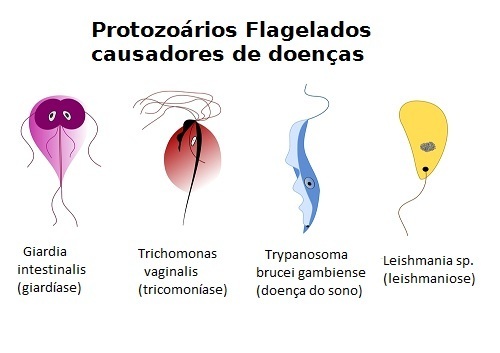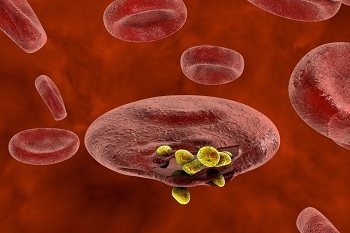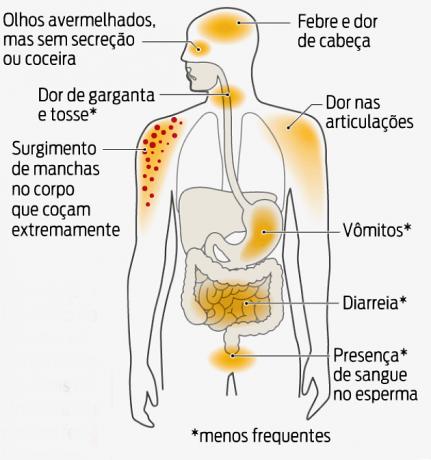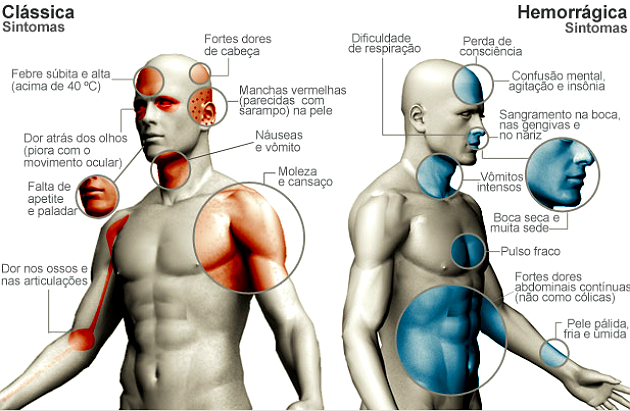At protozooses are diseases transmitted by protozoa. Despite being free-living organisms, in most cases, some protozoa are parasites of animals and humans. Amebiasis, Giardiasis, Malaria, Chagas Disease are some of these protozooses.
The parasites are usually transmitted by water and food contaminated by faeces, which contains the cysts of these microorganisms.
Cysts are an inactive form, which allows protozoa to resist for long periods in the environment, being activated in the host's body.
 Some of the parasites that cause protozoa
Some of the parasites that cause protozoa
Malaria is an exception, as the protozoan is transmitted by the bite of an insect. The greatest occurrence of these diseases is in poor countries, where basic sanitation and efficient water treatment are lacking. Furthermore, the lack of hygiene habits contributes to the spread.
Chagas disease
The contamination occurs mainly by eating food contaminated with the insect's feces.
It can also be through blood transfusion, transplantation of contaminated organs or even be transmitted from mother to baby during pregnancy (congenital).
It is estimated that in Brazil about 3 million people have this disease. caused by Trypanosoma cruzi, which is a flagellated protozoan that parasitizes wild animals such as armadillos.
Another species of this protozoan causes the sleeping sickness, which is very common in Africa. About 95% of cases are caused by Trypanosoma brucei gambiense, which occurs in central and western Africa. There is also the Trypanosoma brucei rhodesiense, in eastern and southern Africa.
Malaria
 Plasmodium (yellow) infecting blood cells
Plasmodium (yellow) infecting blood cells
Caused by different species of plasmodium-type protozoa, being more common in Brazil the Plasmodium vivax.
THE Malaria is transmitted to man through the bite of a mosquito of the genus Anopheles. It can also be transmitted by blood transfusion.
Malaria still kills hundreds of thousands of people around the world today. Especially in poor countries, where there is less investment in research to eradicate the disease.
Read too:
- Chagas disease
- Protozoa
- Useful or Harmful Invertebrates?
Amebiasis
The transmission of the disease occurs mainly through ingestion of water or food contaminated by feces containing amoeba cysts. It can also be sexually, through oral-anal contact, but this is rarer.
THE amoebiasis or amoebic dysentery is caused by the pathogenic form of the amoeba, called Entamoeba histolytica. It happens a lot in poorer countries, estimating that 50% of people are infected each year.
Giardiasis
Infection occurs both through ingestion of contaminated water and food, and through direct contact of the hands with objects contaminated by the cysts.
The causative agent of giardiasis is the flagellate protozoan Giardia lamblia, whose cysts are eliminated in the feces of infected people.
Trichomoniasis
THE trichomoniasis is a sexually transmitted disease caused by Trichomonas vaginalis. It is commonly transmitted between partners who do not use adequate protection (condoms) and can affect both men and women.
toxoplasmosis
Toxoplasmosis is a disease caused by the protozoan Toxoplasma gondii found in cat feces.
Human beings are contaminated by consuming meat from undercooked birds and mammals and with parasite cysts.
The disease can also be congenital, resulting from the mother's infection during pregnancy.
Learn more about diseases by reading the articles:
- STD - Sexually Transmitted Diseases
- Diseases Caused by Bacteria
- Virus Diseases
- Diseases Caused by Fungi


